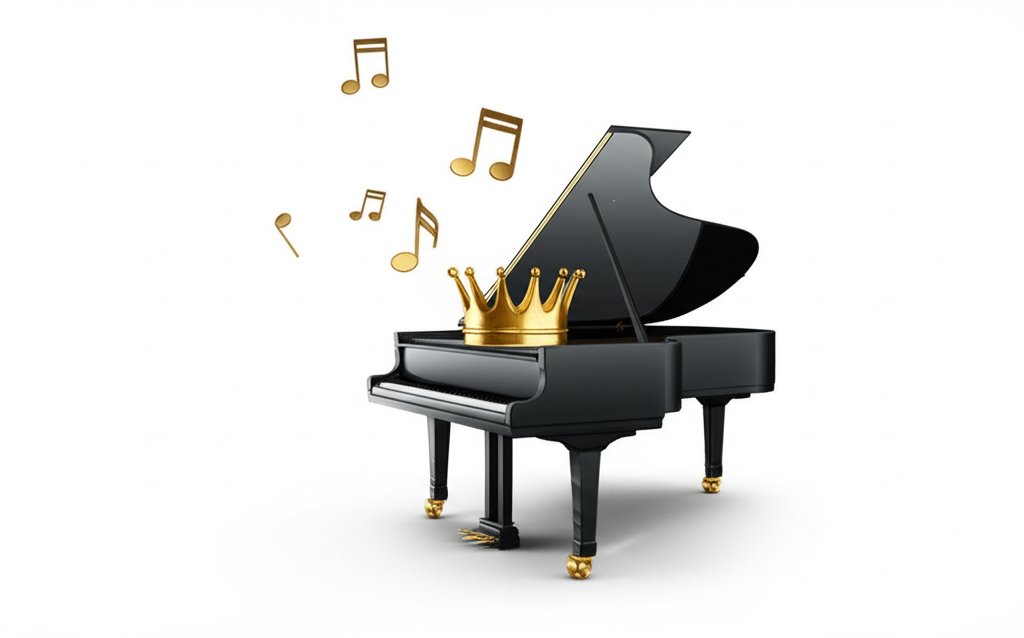The thunderous applause fades, the broadcast ends, but for the newly minted Van Cliburn Competition winners, the real work has just begun. Earning the gold medal at this legendary Fort Worth showdown isn’t an endpoint; it’s a launchpad, catapulting a young pianist from prodigious talent to a global artistic force with a meticulously managed career. It’s a transformation that defines the very arc of modern classical music.
This competition is more than a contest; it’s an anointment. We’ll move beyond a simple list of names to explore the profound impact of this prize, examining the careers it has forged and the artistic legacies it continues to build.
At a Glance: What This Article Covers
- The Gold Medal’s Real Worth: Unpacking the three-year career management package that turns a win into a sustainable international career.
- A Legacy of Virtuosity: Exploring the diverse career paths of legendary laureates, from Radu Lupu to Yunchan Lim.
- The “Cliburn Effect”: How the competition’s massive media exposure, like Yunchan Lim’s viral Rachmaninoff performance, creates instant global stars.
- Beyond First Place: Understanding the significant careers built by silver and bronze medalists.
- Spotlight on the Latest Winners: A detailed look at the 17th Competition and the new generation of artists taking the stage.
- Frequently Asked Questions: Clear answers to common questions about prize money, shared medals, and post-competition life.
More Than a Medal: The Career-Making Machine
Winning the Cliburn gold is often framed by the six-figure cash prize—$100,000 USD for the 2025 gold medalist, Aristo Sham. While significant, the prize money is arguably the least impactful part of the reward. The true treasure is the comprehensive, three-year career management and support package that comes with the title.
Think of it as a world-class career incubator. Immediately following their victory, Van Cliburn Competition winners are provided with:
- Extensive Concert Bookings: The Cliburn Foundation leverages its global network to schedule a full calendar of performances, from solo recitals to engagements with major orchestras.
- Comprehensive Artistic Guidance: Winners receive mentorship to help them navigate repertoire choices, develop new programs, and manage the intense pressures of a touring schedule.
- Professional Media Training: Laureates are coached on how to handle interviews, engage with the press, and build a compelling public persona. This is crucial in an age where an artist’s story is as important as their performance.
- Logistical and Financial Support: The foundation manages the complex travel, scheduling, and financial details, allowing the artist to focus purely on their music.
- Commercial Recording and Promotion: A key component is a professionally produced studio recording, distributed globally, along with a full-scale promotional package to cement their place in the market.
This holistic support system is what separates the Cliburn from many other competitions. It doesn’t just identify talent; it actively cultivates and sustains it, ensuring the initial victory translates into a lasting career.
A Golden Thread Through Piano History
Since Ralph Votapek took home the first gold medal in 1962, the roster of Van Cliburn Competition winners has become a who’s who of the piano world. Each laureate reflects the artistic sensibilities of their time while building a unique career. For a complete list of medalists from every competition, you can explore this detailed guide: Meet the Van Cliburn winners.
Let’s look at a few distinct eras and the artists who defined them:
The Formative Years: Establishing a Legacy
The early winners set a formidable standard. Radu Lupu (1966 Gold) became one of the most revered and enigmatic pianists of the 20th century, known for his profound interpretations of Schubert and Brahms. Cristina Ortiz (1969 Gold) from Brazil brought a fiery and charismatic presence to the international stage. These artists proved that a win in Fort Worth was a ticket to the world’s most prestigious concert halls.
The Era of Shared Gold: Acknowledging Equal Genius
Twice in its history, the jury found itself unable to choose a single winner, resulting in a tie for the gold medal.
- 2001: Olga Kern and Stanislav Ioudenitch shared the top prize. Kern became a glamorous and powerful international soloist, while Ioudenitch focused on a celebrated career as both a performer and a highly sought-after teacher.
- 2009: The prize was split between the explosive virtuosity of Haochen Zhang and the soulful, blind pianist Nobuyuki Tsujii. Tsujii’s victory, in particular, captured the world’s imagination and brought a new level of public attention to the competition.
These instances underscore the Cliburn’s commitment to rewarding supreme artistry, even when it manifests in two equally compelling, yet different, performers.
The Modern Phenom: The Rise of Yunchan Lim
The 2022 competition, the 16th edition, marked a seismic shift with the arrival of 18-year-old Yunchan Lim. His performance of Rachmaninoff’s Piano Concerto No. 3 in the final round wasn’t just a competition winner; it was a cultural event. The video garnered over 1.2 million YouTube views within 24 hours, and the competition webcast reached a staggering 40 million views across 170 countries. Lim became the youngest-ever winner, and his immediate ascent to sold-out halls worldwide exemplifies the modern “Cliburn Effect”—where viral media exposure amplifies a win into instant global stardom.
Spotlight on the 17th Competition (2025)
The most recent competition continued the tradition of identifying breathtaking new talent. Held at Bass Performance Hall in Fort Worth, the 17th edition featured several key changes, including a mandatory Mozart concerto in the semifinal round, conducted by Carlos Miguel Prieto. This replaced the chamber music requirement from 2022, placing a renewed emphasis on classical poise and collaboration.
The winners represented a diverse international field:
| Medal | Winner | Prize | Age | Nationality |
|---|---|---|---|---|
| Gold | Aristo Sham | $100,000 USD | 29 | Hong Kong |
| Silver | Vitaly Starikov | $50,000 USD | 30 | Russia/Israel |
| Bronze | Evren Ozel | $25,000 USD | 26 | USA |
| Aristo Sham also captured the Audience Award, signaling a deep connection with the listeners. Evren Ozel further distinguished himself by winning the award for the best performance of a Mozart concerto, affirming the jury’s focus on this core repertoire. |
It’s Not Just About the Gold
While the gold medalist receives the most attention, the Cliburn has a remarkable track record of launching the careers of its other laureates. Finishing as a silver or bronze medalist is a mark of elite artistry and often leads to a major international career.
- Beatrice Rana (2013 Silver Medalist): The Italian pianist has become one of the most celebrated artists of her generation, signing an exclusive recording contract with Warner Classics and performing with the world’s top orchestras.
- Kenny Broberg (2017 Silver Medalist): An American pianist, Broberg has maintained a busy international concert schedule and is praised for his thoughtful and powerful interpretations.
- Joyce Yang (2005 Silver Medalist): A perennial audience favorite, Yang has built a vibrant and successful career in North America and beyond, earning a Grammy nomination for her debut album.
These artists demonstrate that the platform provided by the Cliburn extends far beyond the top prize. The exposure, industry connections, and stamp of approval from the competition are invaluable for all finalists.
Quick Answers to Common Questions
A competition of this stature naturally generates many questions. Here are clear answers to some of the most frequent ones.
Q: How much prize money do Van Cliburn Competition winners receive?
A: For the 17th Competition in 2025, the Gold Medalist received $100,000, the Silver Medalist $50,000, and the Bronze Medalist $25,000. Finalists who do not win a medal each receive $10,000, and there are additional cash prizes for specific performances, such as best Mozart concerto.
Q: Who is the youngest person to win the Van Cliburn?
A: Yunchan Lim of South Korea holds the record. He won the 16th Van Cliburn International Piano Competition in 2022 at the age of 18.
Q: Has there ever been a tie for the gold medal?
A: Yes, twice. In 2001, the gold was shared by Olga Kern and Stanislav Ioudenitch. In 2009, Haochen Zhang and Nobuyuki Tsujii were named co-gold medalists.
Q: What happens to the winners after the three-year management period?
A: The three-year package is designed to be a launchpad. By the end of this period, the winners have established the professional relationships, performance history, and industry reputation needed to secure top-tier commercial artist management and sustain their careers independently for decades to come.
Your Invitation to Listen
The story of the Van Cliburn Competition winners is not a static list of names in a history book; it’s a living, breathing symphony of careers that continue to unfold on the world stage. The next time you see a laureate’s name on a concert program—whether it’s a recent winner like Aristo Sham or a titan like Radu Lupu—you’re not just listening to a pianist. You’re hearing the product of immense talent, grueling preparation, and the career-defining endorsement of one of the world’s most important musical institutions.
The best way to appreciate their journey is to listen. Seek out their recordings, attend their concerts, and follow the next generation of talent as they emerge from Fort Worth, ready to make their mark on the world.
- Discover Affordable Singing Lessons Near Me to Unlock Your Potential - February 24, 2026
- Affordable Vocal Lessons Bring Professional Singing Guidance Within Reach - February 23, 2026
- Local Vocal Lessons Offer Expert Guidance for Every Singer - February 22, 2026










